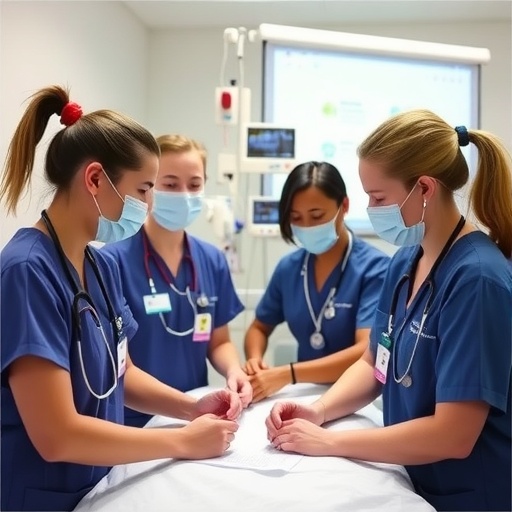In recent years, advancements in critical care have led to increased interest in complex life-support technologies, particularly Extracorporeal Membrane Oxygenation (ECMO). This technique, which provides both cardiac and respiratory support to patients in severe distress, has become a cornerstone of modern intensive care medicine. However, the effective deployment of ECMO relies heavily on the enhanced competencies and confidence of the nursing staff who manage these sophisticated systems. In this context, a groundbreaking study by Savaş, Güler, and Kocabeyoğlu sheds light on the development of an ECMO training program tailored for Intensive Care Unit (ICU) nurses. This program aims to bolster knowledge acquisition and assess self-efficacy outcomes, demonstrating the dynamic role that education plays in critical care practices.
The training program was designed as a quasi-experimental evaluation, incorporating hands-on techniques and evidence-based learning to empower ICU nurses with the necessary skills to operate ECMO devices effectively. Given the complex nature of ECMO, the program’s curriculum focused on both theoretical foundations and practical simulations. By elevating the educational framework for nurses, the study sought to enhance patient outcomes, safety, and overall proficiency in ECMO management.
The significance of education in critical care nursing cannot be overstated. As ECMO technology evolves, the demand for advanced nursing skills amplifies. This study underlines how structured training programs can bridge the knowledge gap. Continuous professional development is vital for ICU nurses who encounter various clinical scenarios requiring swift decision-making connected to patient life support systems. Notably, the research emphasizes the necessity of periodic assessments to identify gaps in knowledge and implement appropriate training interventions, enhancing both nurse capability and patient care quality.
Additionally, the authors presented a detailed evaluation of the training program’s impact on nurses’ self-efficacy. Self-efficacy, the belief in one’s ability to succeed in specific situations, has been proven to influence performance and motivation in various healthcare settings. By equipping ICU nurses with a robust training program, the study not only addresses knowledge deficits but also aims to elevate their confidence levels when interacting with ECMO systems. This multifaceted approach serves to invigorate the professional landscape and challenge prior perceptions surrounding critical care delivery.
The study gathered quantitative and qualitative data through a series of assessments and evaluations. Participants engaged in pre-training and post-training evaluations that highlighted significant improvements in both knowledge and self-efficacy related to ECMO management. The results suggest that comprehensive training can produce tangible benefits, fostering a culture of continuous learning in the ICU. As nurses feel more competent and assured in their capabilities, the quality of care delivered to critically ill patients is likely to improve dramatically.
Furthermore, the study spotlights the collaborative nature of the development process. The authors engaged with experienced nursing professionals to ensure that the training curriculum accurately addressed real-world challenges faced in the ICU environment. This participatory approach is pivotal, as it not only bolsters the relevance of the training material but also integrates the insights of seasoned practitioners, enriching the overall content delivered to participants.
The implications of these findings extend beyond any single institution. As healthcare systems continually strive for excellence in patient care, scalable training programs like the one proposed in this study could be adapted for various settings globally. The authors reflect on the universality of the challenges faced by ICU nurses and assert that by equipping them with the resources needed to navigate ECMO complexities, healthcare systems can vastly improve patient survival rates and recovery experiences.
Moreover, the COVID-19 pandemic has underscored the critical need for advanced training programs in critical care. With an influx of patients requiring intensive support, many healthcare systems found themselves underprepared. This study offers a timely reminder of the importance of investing in nursing education and training, particularly in preparation for public health emergencies where advanced interventions like ECMO may be required.
In conclusion, the study’s findings are anticipated to inspire further research into effective training methodologies. The authors advocate for an ongoing examination of educational frameworks to ensure they remain relevant and effective in the fast-paced world of critical care. As hospitals continue to rise to the challenges presented by evolving medical technologies and varying patient needs, the importance of a competent, confident nursing workforce cannot be overstated. With further integration of training programs, there is hope for a future where ICU nurses are not only knowledgeable but also empowered, resulting in enhanced patient care across the board.
As the field of critical care evolves, so too must the educational paradigms that underpin nurse training. Effectively utilizing ECMO technology is only the beginning; continuous improvement and development of the nursing workforce will be paramount to meeting future healthcare demands. This study serves as a critical step towards establishing comprehensive training regimes that are essential for nurturing skilled professionals capable of delivering the highest standard of care to the most vulnerable patients.
The fusion of innovation in technology and education in healthcare has the potential to redefine the parameters of patient care. Ultimately, with visionary efforts like those proposed by Savaş, Güler, and Kocabeyoğlu, the healthcare community can begin to unlock the full potential of ECMO – ensuring that critically ill patients receive the specialized care they desperately need, at the hands of well-trained and confident nursing professionals.
Subject of Research: Development of ECMO training program for ICU nurses knowledge gain and self-efficacy outcomes assessment.
Article Title: Development of ECMO training program for ICU nurses knowledge gain and self-efficacy outcomes assessment: quasi-experimental evaluation.
Article References: Savaş, H., Güler, S. & Kocabeyoğlu, S.S. Development of ECMO training program for ICU nurses knowledge gain and self-efficacy outcomes assessment: quasi-experimental evaluation. BMC Nurs 24, 1293 (2025). https://doi.org/10.1186/s12912-025-03931-y
Image Credits: AI Generated
DOI: 10.1186/s12912-025-03931-y
Keywords: ECMO, intensive care, nursing education, self-efficacy, patient outcomes, critical care, training program.




